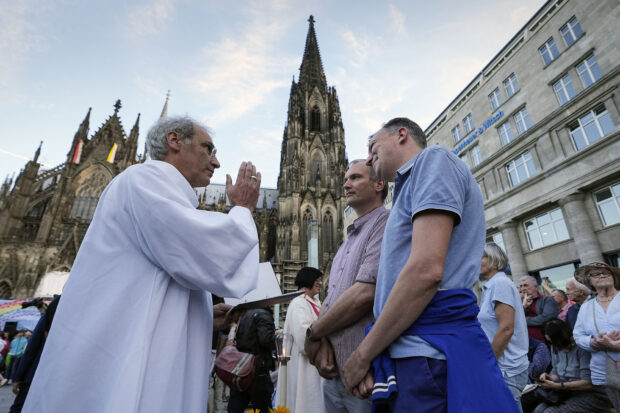
FILE – Same-sex couples take part in a public blessing ceremony in front of the Cologne Cathedral in Cologne, Germany, on Sept. 20, 2023. Pope Francis has formally approved allowing priests to bless same-sex couples, with a new document released Monday Dec. 18, 2023 explaining a radical change in Vatican policy by insisting that people seeking God’s love and mercy shouldn’t be subject to “an exhaustive moral analysis” to receive it. (AP Photo/Martin Meissner, File)
ROME — The Vatican document explicitly saying Catholic priests can bless same-sex unions lays out the conditions for what such blessings can and cannot involve.
The overall goal is to make it abundantly clear to the couple and those around them that the blessing does not resemble a marriage. The Catholic Church teaches that marriage is a lifelong union between men and women.
Nothing has changed about the church’s position on marriage, its firm opposition to gay marriage, or its belief that any extramarital sex — gay or straight — is sinful.
What does the document say?
The document from the Vatican’s doctrine office explicitly says priests can offer blessings to same-sex couples provided the blessings themselves don’t in any way resemble a marriage. To avoid any confusion, the blessing should not be offered in conjunction with a civil union ceremony, gay or straight.
Does this mean priests can marry LGBTQ+ couples?
No. Nothing has changed about the Catholic Church’s firm opposition to gay marriage or its teaching that homosexual acts are “intrinsically disordered.” Rather, this new document aims to allow any couple in an “irregular union” to seek and receive God’s love and mercy through a blessing. That can include LGBTQ+ couples and heterosexual couples who haven’t been married in the church.
How can these blessings be performed?
These blessings can be offered during a visit to a Catholic shrine, a meeting with a priest, a prayer recited in a group, or a pilgrimage. But they cannot be performed with “any clothing, gestures, or words that are proper to a wedding.”
Are these prayers written down?
To prevent any confusion with the official prayers of the church, the blessing should not be codified or established by set procedures or rituals by dioceses or bishops’ conferences. Rather, priests should be trained to “spontaneously” offer blessings outside the church’s approved blessings.
Is there more to come?
To drive home the spontaneous, informal nature of these blessings, the Vatican said it has no plans to regulate details or practicalities about same-sex blessings or respond to further questions about them, leaving it to individual priests to work out.